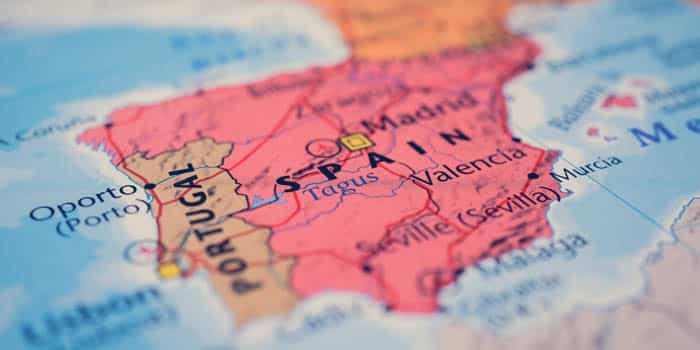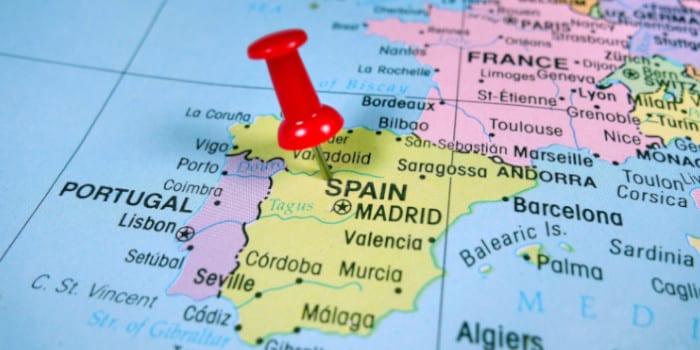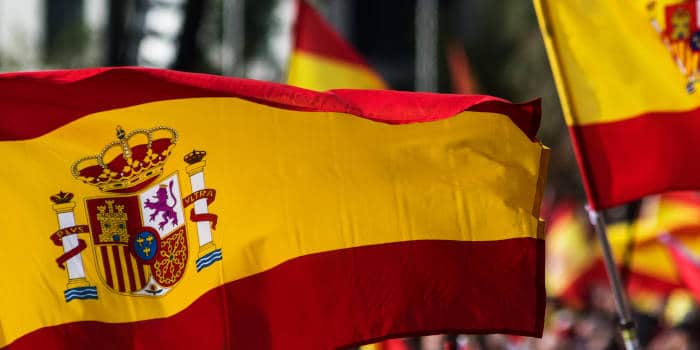- Casino
- By State
- Alabama
- Alaska
- Arizona
- Arkansas
- California
- Colorado
- Connecticut
- Delaware
- Georgia
- Florida
- Hawaii
- Idaho
- Illinois
- Indiana
- Iowa
- Kansas
- Kentucky
- Louisiana
- Maine
- Massachusetts
- Maryland
- Michigan
- Minnesota
- Mississippi
- Missouri
- Montana
- Nebraska
- Nevada
- New Hampshire
- New Jersey
- New Mexico
- New York
- North Carolina
- North Dakota
- Ohio
- Oklahoma
- Oregon
- Pennsylvania
- Rhode Island
- South Carolina
- South Dakota
- Tennessee
- Texas
- Utah
- Vermont
- Virginia
- Washington
- West Virginia
- Wisconsin
- Wyoming
- By State
- Slots
- Poker
- Sports
- Esports
Spain Loses 50% of Gambling Revenue in 2020 Year-over-Year

Gambling sector sees 50% drop compared to 2019 reports the latest Yearbook of Gaming in Spain 2020.
Spanish Gambling Experiences Hardships in Pandemic Year
The Spanish gambling industry association, Cejuego, and the University Carlos III of Madrid have compiled a revised outlook of the gambling industry in the country, reporting a 50% drop in gambling revenue, a combination of stricter consumer protection measures, financial hardship and lack of opportunities to gamble as much.
The Yearbook of Gaming in Spain 2020, conducted by José Antonio Gómez Yáñez, cautioned that gambling was one of the most heavily impacted sectors in the country. According to Yáñez the road to recovery will be a long one for gambling operators, and not least because of new government measures.
The author of the report explained that the latest evidence from the lockdown suggested that gamblers weren’t prone to reckless practices during the lockdown. He further explained that the gambling sectors was one of the first to close and last to open, not accounting for the second coronavirus wave which forced new closures.
Lashing out against the industry may be unwise, cautioned Yáñez he reminded that the gambling industry contributes some €1.13 billion in tax to communities and another €600 million in general taxes. The professor likened the gambling sector to “milking a cow” and said that it should not be over-burdened unnecessarily.
Yáñez reassured that Spain does not have a gambling problem and that only 0.3% of all gamblers have or exhibit problem gambling behavior. He further noted that the percentage of young people is around 17% of the population whereas the average for Europe is 24%.
Numbers Collapse Two-Fold in First 10 Months
Based on those numbers, figures for the first ten months of the month dropped to €4.35 billion in gross revenue, or down 50% year-over-year. Gaming companies generated some €2.45bn while the national Organización Nacional de Ciegos Españoles (ONCE) and Sociedad Estatal Loterías y Apuestas del Estado (SELAE) lotteries contributed another €1.90 billion.
Gaming remains a small part of the country’s GDP, but it has been posting steady results over the past years, with revenue climbing up exponentially since Spain’s most recent economic crisis. The report factored that and argued that even the 2019’s results were not all-time high.
Bingo halls and hospitality industry machines were the main driver of revenue in 2019, with the industry employing 84,797 people. Once again, the workforce was spread between the privately-owned companies and the state-controlled entities.
Despite a slowdown in results, Spain’s online gambling numbers grew in October, with the country posting increase 17.7% year-over-year, and online gambling has generally done well in the pandemic.
Related Topics:
Mike made his mark on the industry at a young age, consulting for companies that would later become regulators. As one of the lead editor of Gambling News, he dedicates his weekdays to this project, aiming to educate the masses on the latest developments in the gambling circuit. His expertise and passion for the industry make him an invaluable asset to our team.
Previous Article

Industry
December 2, 2020
L.A. County Cities Ask to Continue Casino Operations Despite COVID Restrictions

Next Article


Industry
December 2, 2020
Caesars Sells Operations at Belle of Baton Rouge in Louisiana
Must Read
Industry
July 14, 2025
Senate Blocks Attempt to Reverse Gambling Tax Rule
More Articles






Casino
July 10, 2025
Cirsa Shares Hold Steady in Lukewarm Spanish IPO Debut

Industry
July 2, 2025
Cirsa’s IPO to Seek Valuation of Almost $3B

Industry
June 26, 2025
Spain’s Gambling Ad Ban Cuts New Accounts by 55%

Industry
February 11, 2025
DGOJ Welcomed Spanish Operators and Regulators in Latest AML Meeting

Casino
February 7, 2025
Royal Caribbean Drops Wine Bar in Favor of Non-Smoking Casino









